In antiquity it used to be called Aristera and Pausanias mentions it in his Description of Greece. To this day the price of its acquisition from the descendants of its former owner, the shipowner Ioannis Leonidas, is unknown, mainly due to his secretive personality which surrounded his life and which he imposed on others. In his book (published in 2001), Ioannis Fragoulis, a close associate of Niarchos and captain at the time of the yacht Creole, shares with us rare inside information: “During that year Spetsopoula was set to be among our cruise’s designated destinations in the Aegean. We anchored mid-sea, at the narrow straight between Spetses and Spetsopoula, since the natural harbour of the small island was not ideal for vessels with Creole’s draft. Once ashore, Niarchos and his guests disembarked and went on a stroll around to assess the island.
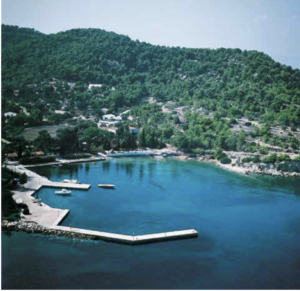
Around the harbour there were a few small houses which used to be occupied by the former owner’s staff, a few storehouses, a chapel, St. Nicholas, and further away a small electric generating station. An unpaved track setting off at the natural harbour led us to an estate, roughly 500 metres off the harbour. The estate belonged to Leonidas, the former owner of Spetsopoula. The view from the hill it was situated upon, was unique. It was a green and blue view of the sea, of the pine trees and olive groves and of a vast sky which embraced the clear blue sea. In the horizon one could discern the neighbouring islets of Trikeri and Dokos and the Peloponnesian shores”.
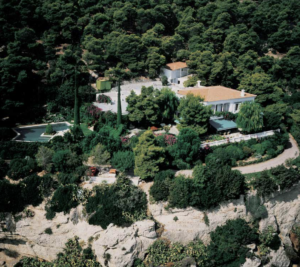
Same as Scorpios, Spetsopoula was a barren island with water-shortage problems. Water was supplied during the first years by means of a fishing boat which would transport water from the Peloponnese, but the increased need, mainly for the watering of the trees and plants, required a more radical solution. And so it happened. Amphitrite, an old 650-ton tanker, which Niarchos had bought in England, was transformed into a water-tanker. At the same time, he covered the cost of the island’s cable connection to Spetses, which allowed him to have electricity and telecommunications. Another necessary deed was the transformation of the harbour which would allow the docking of boats and mainly of Creole. The project was undertaken by professor Peppas, a harbour-construction specialist and the result, as seen in the photos, is impressive, allowing the natural environment to remain intact.
The small harbour in the southwest side of the island was transformed into a functioning beach, with platforms, sun- bathing lounges and cabanas. Even a shark net had been part of the plans, situated in such a way so as not to hinder the entering and exit of boats with a small depth.
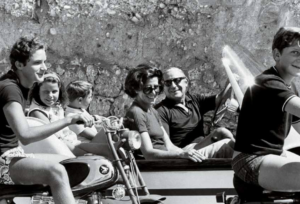
In September 1964, Stavros Niarchos offered the island to king Constantine of the Hellenes to spend a few days of his honeymoon with Anna-Maria. However, the island was not to be associated only with happy moments. In 1970, Eugenia Niarchos died unexpetedly on Spetsopoula. As Ioannis Fragoulis explains: “The most prevalent version in the Press at the time about Eugenia’s death was that ‘she was beaten-up by her husband’. The episode that brought on the dramatic ending began, as they wrote, with an intense quarrel between the couple, caused by Mrs. Ford who would be visiting Spetsopoula along with her daughter, Elena, in order to celebrate on the island the latter’s fourth birthday. Niarchos and his defence presented a different story. They agreed that the quarrel indeed took place, but it did not end with use of force. After the argument, Eugenia shut herself in her room to calm herself down. After quite a while Niarchos also decided to retire. Passing outside her room, and perhaps because he felt guilty, he entered the room only to be shocked by the unexpected sight: his wife was found lying down, unconscious, on her bed. He panicked, and during his confusion he slapped her in the face to bring her back to her senses, he pressed her stomach to cause vomiting, sure that, due to her being upset she had overdosed on the barbiturates which she used to take. He ordered the staff to bring some water and coffee and they tried in vain to force her to swallow it. He desperately called for help and asked the doctor of the shipyard to come urgently with whatever was necessary for a stomach pump. The helicopter took off from Spetsopoula and soon returned with the doctor, but it was already too late”.
Finally, after a long legal battle, Niarchos was found innocent, since the Greek justice reached the conclusion that it was a case of suicide. In the summer of 1993, the Greek shipowner spent his last summer on Spetsopoula. Three years later he died in Switzerland. According to his will, the co-owners of the island were now his two sons, Philippos and Stavros.
The aforementioned, along with their children Stavros, Teo, Electra, Electra, Nicolas-Stavros, Alexis and Ines-Sophia nowadays enjoy the heaven on earth created by the family’s patriarch, opposite the island of Spetses.
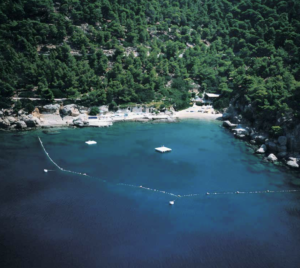
The protective shark-net is discernible. In this area, apart from the changing rooms which
are set in a rock, a bit further up from the sand, there’s a small bar which offers a cool shade to the bathers, who, under a wooden cover, are served refreshments and drinks as well as lunch, which the bell boys bring with the island’s small carts from the main villa. Further down, a built barbecue, in a specially designed area with stone benches and tables, surrounded by fragrant bushes and flowers, hosts the guests at night.
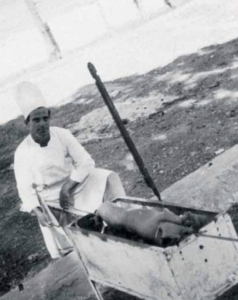
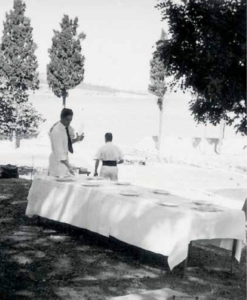
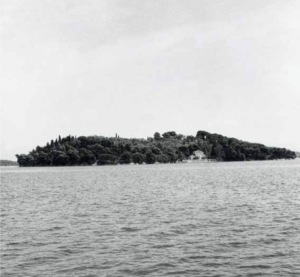
By Christos Zampounis
